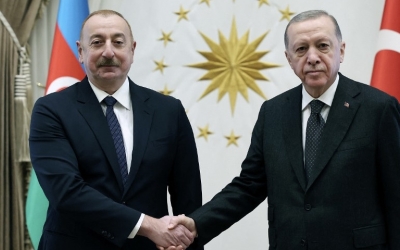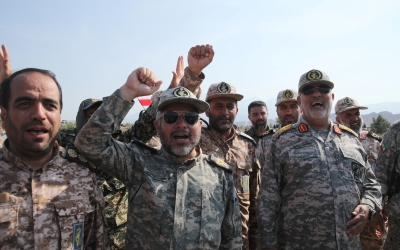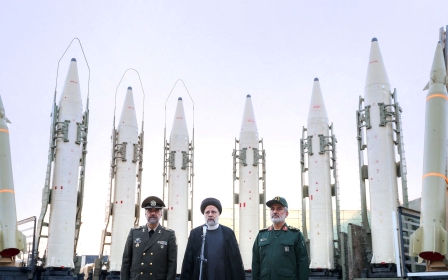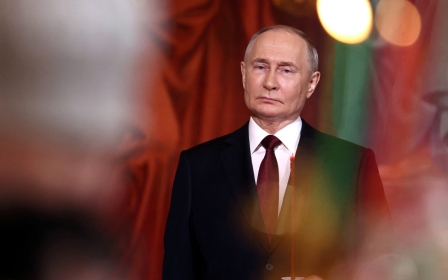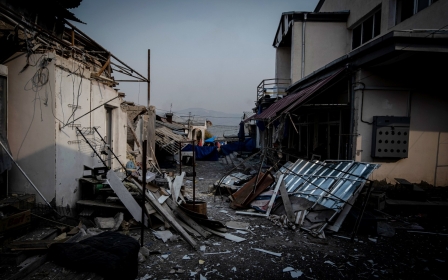Inside the Iran-Russia tensions over an Azerbaijan transport corridor
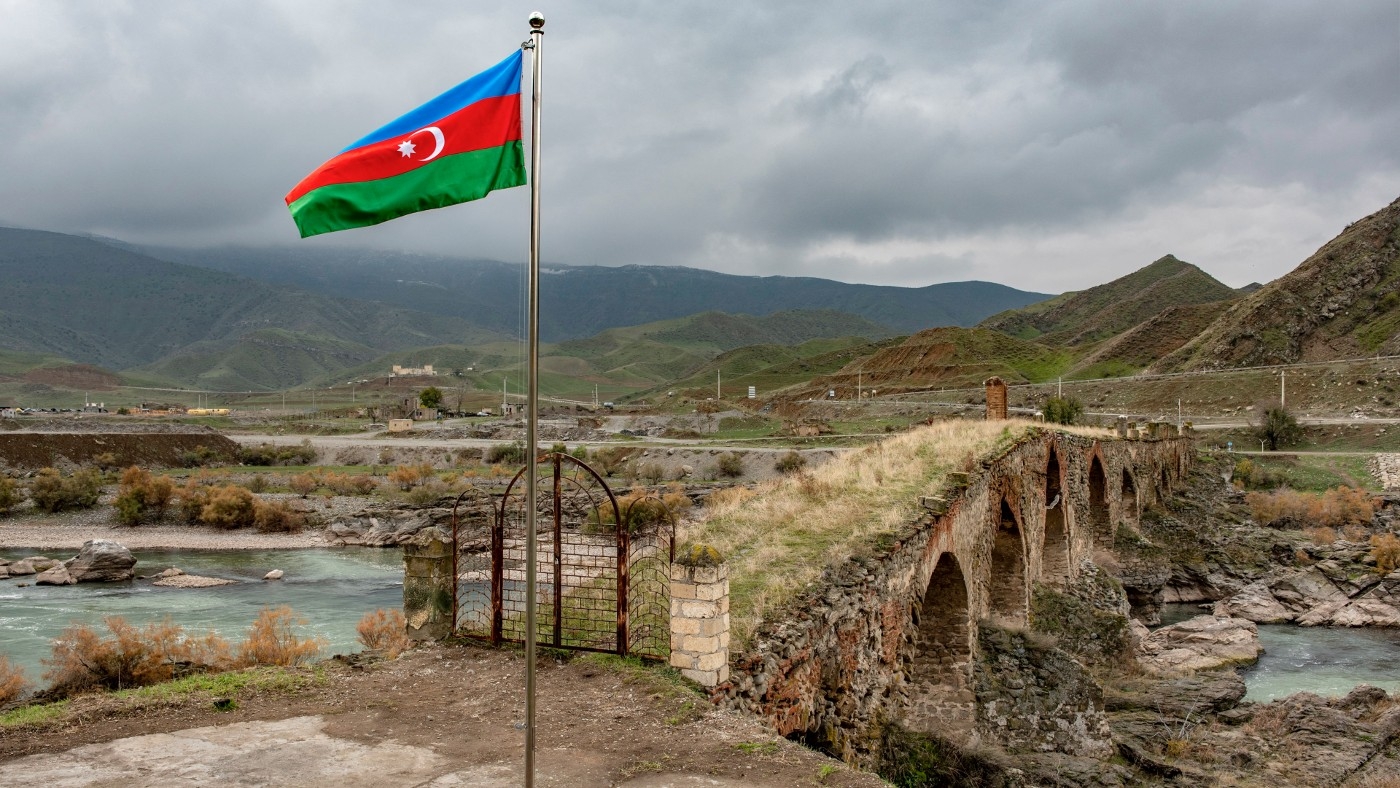
Russia and Iran are at odds in the South Caucuses, with tensions between the two heightened by a proposed transport route known as the Zangezur corridor.
Russian officials, including Foreign Minister Sergey Lavrov, recently expressed support for the corridor, which would connect Azerbaijan and its exclave Nakhchivan to Russia and Turkey, bypassing Armenian checkpoints and establishing a new route linking Asia, Europe and the Middle East.
Iran sees this as a strategic threat and a violation of its borders, and on 3 September the new reformist government in Tehran “invited” Russian ambassador Alexey Dedov to come and discuss the situation.
“We did not officially term it the 'summoning' of the ambassador, but by holding such a direct meeting, we sent a clear message to Moscow that we are discontented, and their position contradicts ours,” a senior Iranian foreign ministry source told Middle East Eye, on condition of anonymity.
The Zangezur corridor would run through the Syunik province of Armenia, but the Azerbaijan government in Baku wants to have full sovereignty along the route. Iran is opposed to this idea, seeing it as something that would change its own borders, which it does not accept.
New MEE newsletter: Jerusalem Dispatch
Sign up to get the latest insights and analysis on Israel-Palestine, alongside Turkey Unpacked and other MEE newsletters
As such, the Iranian foreign office source emphasised that his government is firm in its stance that the corridor must remain under Armenian control. “Otherwise, we would lose our border with Armenia,” he said.
Trouble on the northern border
The idea for the Zangezur corridor gained momentum after Azerbaijan’s victory in the 2020 Nagorno-Karabakh conflict, which significantly altered the geopolitical dynamics along Iran’s northern borders.
For three decades, this mountainous territory had been under Armenian control before Azerbaijan, with the help of advanced Turkish and Israeli weaponry, seized it.
This reshuffling of regional power has deeply unsettled Iran, which has expressed concern about the Russian-backed settlement's impact on its national interests.
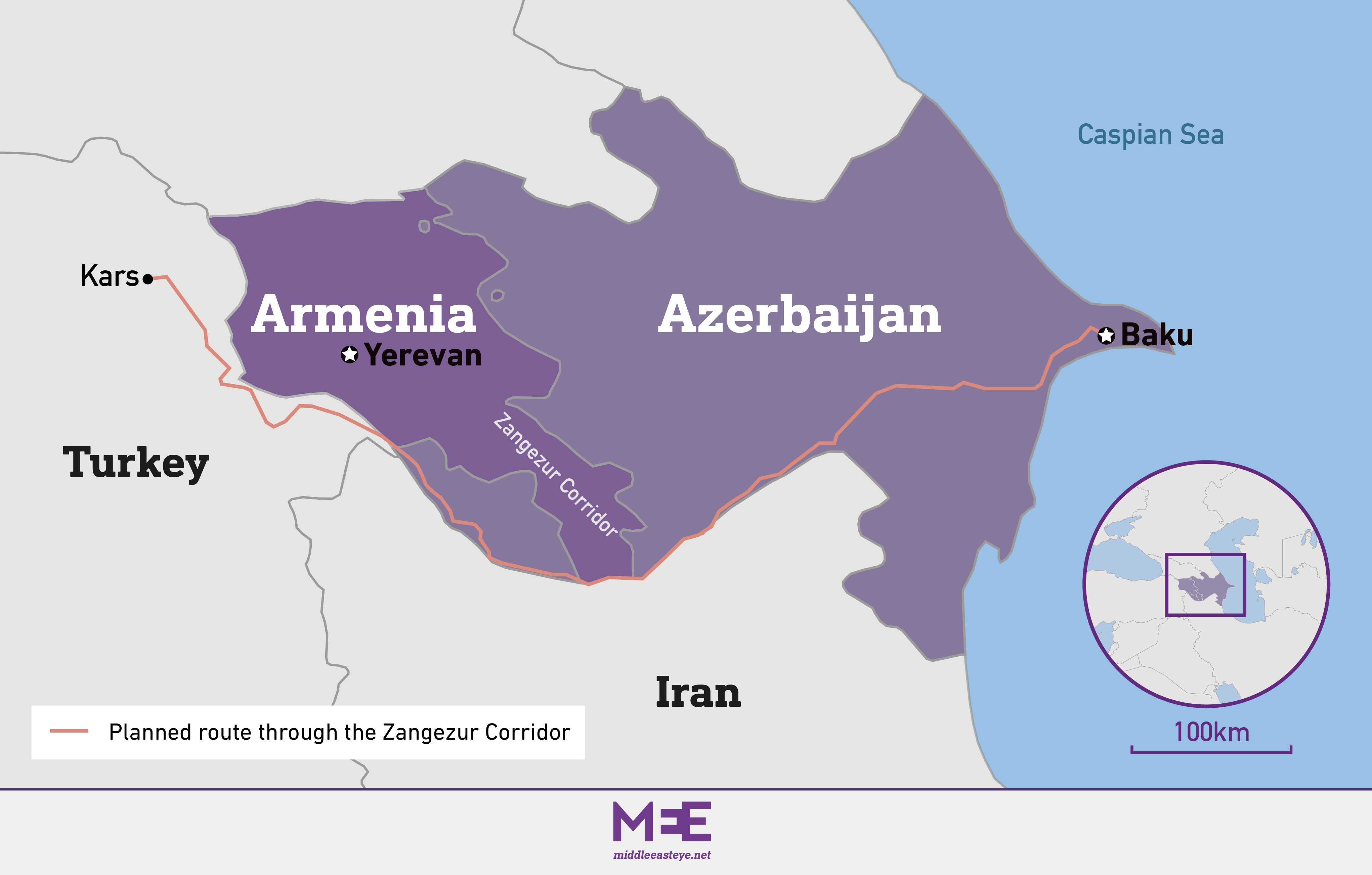
As Russia enters the fray in support of Azerbaijan, Iran’s new president, Masoud Pezeshkian, prepares to meet Russian President Vladimir Putin at the Brics summit, scheduled to begin on 22 October in Kazan.
In the West, the summit is being looked at for the cooperation between Moscow and Tehran: US Secretary of State Antony Blinken said last week that Russia had received ballistic missiles from Iran and was likely to use them in Ukraine within weeks, a charge Iran denies.
The Iranian foreign ministry source agreed that the meeting between Pezeshkian and Putin was likely to be cordial.
“Since this will be their first meeting, they will likely focus on agreements rather than disagreements,” he said. “We do not want our relations with Russia to be harmed, which is why we are managing the relationship carefully. Sometimes we accept their requests, and sometimes we don’t.”
'We do not want our relations with Russia to be harmed, which is why we are managing the relationship carefully'
- Senior Iranian foreign ministry source
The source illustrated this balance with an example: “Despite Moscow’s insistence, Tehran has refused to side with Russia in international organisations on issues like Abkhazia and Crimea.”
Highlighting Tehran’s unwavering stance on the corridor, he said: “As the supreme leader has emphasised, our border with Armenia must remain intact, and any corridor should be established with that in mind… Our military power would only be deployed in response to any attempt to sever Iran’s border with Armenia.”
“Our capabilities in the Caucasus are far-reaching. We have a historical and cultural presence in the region. This is our region,” he said.
Iran lost control of various Caucasus territories in the early 19th century following wars with Russia, including modern-day Azerbaijan, Georgia, Dagestan, Armenia, and Igdir in Turkey. The agreements that ceded those lands continue to rankle Iranian nationalists and are commonly cited to criticise bad contracts or deals.
Relations between Iran and Azerbaijan have often been tetchy. Baku’s friendly relationship with Israel is one particularly large elephant in the room, while both governments have accused the other of espionage and terrorism.
Nevertheless, the Iranian foreign ministry source pointed out that for 30 years Iran has provided a route through its territory that connects Azerbaijan to Nakhchivan, which are separated from each other by Armenia (and Iran).
“The Islamic Republic supports unblocking transit routes in the region,” the source told MEE, “with a firm emphasis on respecting the territorial integrity, sovereignty, and jurisdiction of the countries involved, while also ensuring the mutual interests of all regional nations. This aligns with Armenia’s ‘Crossroad of Peace’ initiative.
“The comments made by the Russian foreign minister were directed at Armenian officials. This reflects the escalating tensions between Russia and Armenia,” the source said.
“As Armenia continues to distance itself from Russia’s influence, Moscow, by raising the corridor issue, seeks to maintain its foothold in the Caucasus."
As an alternative to Zangezur, Iran is - according to a foreign policy expert with ties to the Iranian foreign ministry - proposing improvements to the Aras corridor, the route which connects Azerbaijan to Nakhchivan.
“After Azerbaijan regained its occupied territories from Armenia in the 2020 war, this route was shortened. In response to the new circumstances, Iran has begun upgrading, modernising, and widening this road,“ the policy adviser said.
“By improving the Aras corridor, Iran envisions that not only Azerbaijan but other countries will also be able to use this route. The corridor could potentially become part of a broader East-West passage, or Middle Corridor, starting in Russia and China, passing through Central Asia, the Caucasus, Iran, and Turkey, and extending to Eastern Europe and the UK.”
Strategic competition
Speaking to MEE, a reformist media commentator and foreign policy expert said that these developments are viewed in Iran as a precursor to a broader Israeli and western presence on Iran’s borders.
The commentator argued that this would also strengthen the Turkic world, posing a threat to Iran's identity. Moreover, cutting Iranian access to Armenian territory would ultimately block Iran’s access to Europe, a significant strategic threat.
He argued that Russia’s interests are increasingly at odds with Iran’s.
Russia and China’s pursuit of natural resources and financial markets in the Gulf had led them to support the UAE over Iran in the dispute over three Gulf islands. Russia is also seeking to limit Iran’s access to European oil and gas markets, which it has been removed from following the invasion of Ukraine.
The foreign policy expert said also that its conflict with the West meant that Russia is now reliant on secure routes through the South Caucasus, with its interest in controlling Armenia’s Syunik province adding to the strategic competition with Iran.
One Iranian conservative expert argued that the US and Nato are aiming to expand their influence in the region through Turkey and Azerbaijan (Iran’s frozen and hostile relations with the West mean cooperation in the South Caucasus is highly improbable), while Russia, in its efforts to counter Nato’s presence, is inadvertently furthering the Atlantic alliance’s objectives.
Russia’s strained relations with Armenia, especially over the Collective Security Treaty Organisation (CSTO), have also pushed Moscow closer to Azerbaijan. In June, Armenian Prime Minister Nikol Pashinyan declared in parliament that “we will leave” the Kremlin’s military alliance.
“Meanwhile, Turkey and Azerbaijan are extending their influence and promoting their ideologies, aiming to marginalise Iran from China’s corridor. Armenia seeks to preserve its territorial integrity,” the Iranian conservative expert said.
“Iran, on the other hand, opposes Turkish moves, Nato’s expansion, and Russia’s missteps regarding the so-called Zangezur corridor. Iran’s primary goal is to prevent any shifts in the region’s geopolitical landscape. However, given its close relationship with Russia, Tehran must proceed cautiously."
Middle East Eye delivers independent and unrivalled coverage and analysis of the Middle East, North Africa and beyond. To learn more about republishing this content and the associated fees, please fill out this form. More about MEE can be found here.


